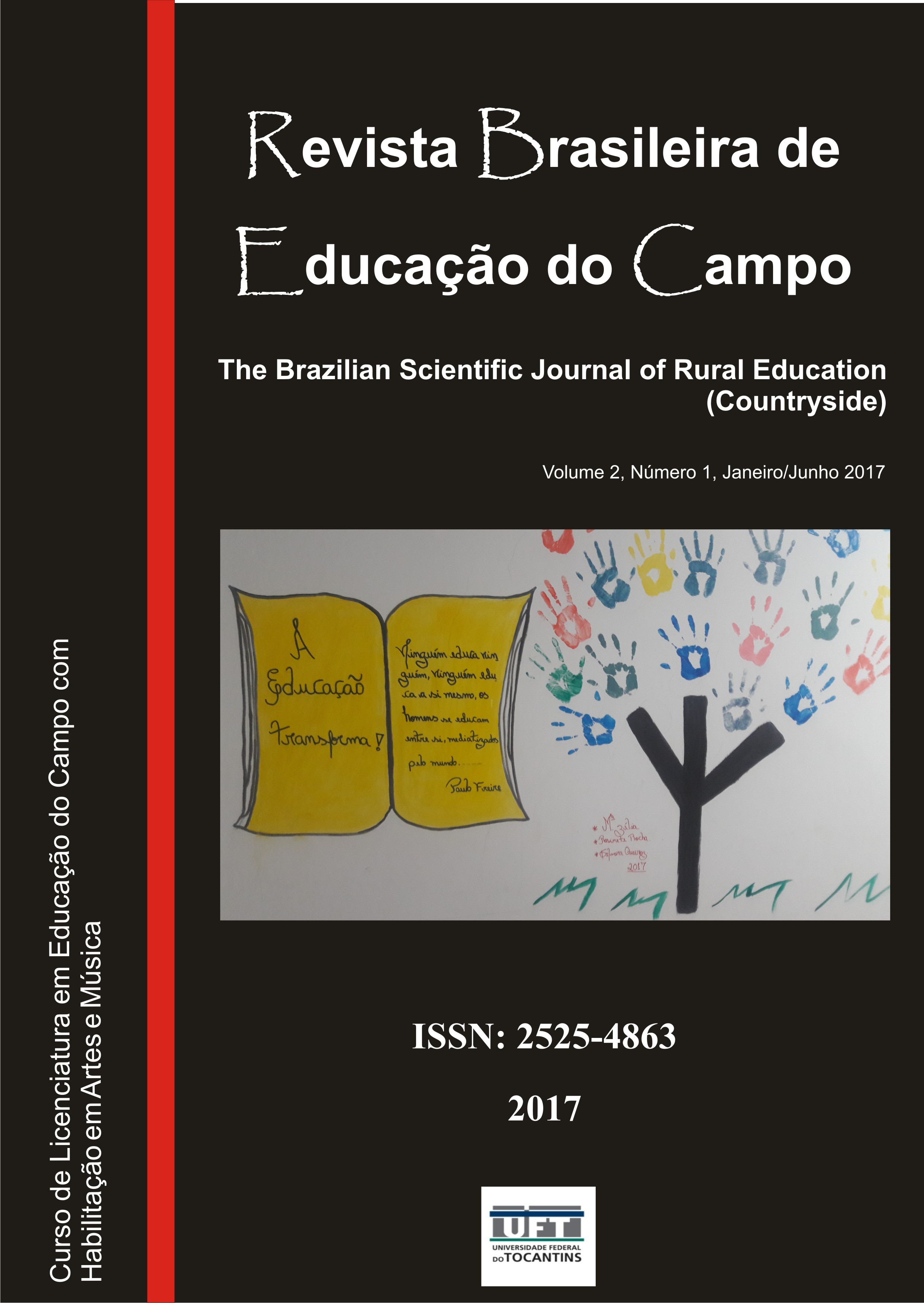Rural Education degree in the Federal University of the Triângulo Mineiro: territory of contradictions
DOI:
https://doi.org/10.20873/uft.2525-4863.2017v2n1p411Abstract
ABSTRACT. Since its establishment the Rural Education degree at the Federal University of the Triângulo Mineiro (UFTM) is facing a number of challenges. One of the previously questions is about the existence or not of the target audience, mainly if the Triângulo Mineiro and Alto Paranaíba have requirement for the course to continue. In this context, the present article presents a study that aimed to identify the training demands, considering above all the dimension of school education. The methodological perspective is diagnostic based on secondary data in a documental analysis. Carrying out this analysis, one of the first discrepancies that we can find is about the own meaning and demarcation of what is the field, within political, administrative and epistemological criteria that need to be problematized. The data suggest that the UFTM's region has, indeed, rural schools, lay teachers, and a struggle for land scenario that is usually silenced, obliterated and poorly understood. Concrete demands were found, not only with regard to the subjects, but also a context for further investigations required to give a new meaning to the territories of university performance.
Keywords: Mapping, Higher Education, Rural Education.
Downloads
Literaturhinweise
Araujo, R., & Chelotti, L. (2013). Geografia da Educação do Campo no Triângulo Mineiro. Revista Histedbr, 226-237.
Brasil. (03 de Abril de 2002). Resolução CNE/CEB 1, De 3 De Abril de 2002. Brasília. Acesso em 2017, disponível em http://portal.mec.gov.br/component/docman/?task=doc_download&gid=13800&Itemid
Caldart, R. S. (2009). Educação do Campo: Notas para uma análise de percurso. Trabalho, Educação e Saúde, 7(1), 35-64.
Carvalho, J., Neves, B., & Melo, R. (2016). Cultiveduca. Rio Grande do Sul, Brasil. Acesso em 2016, disponível em http://cultiveduca.ufrgs.br/pg.index.html
Girardi, E. P. (2015). DATALUTA - Banco de Dados da Luta pela Terra: Relatório Brasil 2014. Presidente Prudente, São Paulo, Brasil.
Haesbaert, R. (2005). Região, diversidade territorial e globalização. Rio de Janeiro, Rio de Janeiro, Brasil. Fonte: http://www.uff.br/geographia/ver_01/Rogerio%Haesbaert.pdf
Instituto Brasileiro de Geografia e Estatística. (2015). Fundação IBGE – Instituto Brasileiro de Geografia. Acesso em 2017, disponível em IBGE: http://www.ibge.gov.br/home/geociencias/geografia/default_regioes_rurais.shtm
Instituto Brasileiro de Geografia e Estatística. (2015). Instituto Brasileiro de Geografia e Estatística. Fonte: IBGE: http://www.ibge.gov.br/home/geociencias/geografia/default_regioes_rurais.shtm
Instituto Nacional de Estudos e Pesquisas Educacionais Anísio Teixeira (INEP). (2007). Panorama da educação no campo. Brasília, Distrito Federal, Brasil. Fonte: http://www.publicacoes.inep.gov.br/portal/download/546
Instituto Nacional de Estudos e Pesquisas Educacionais Anísio Teixeira (INEP). (2015). Censo Escolar 2015. Acesso em 2017. Disponível em: http://portal.inep.gov.br/web/guest/censo-escolar
Minas Gerais. (20 de Dezembro de 2015). Resolução SEE Nº 2820, De 11 de Dezembro de 2015. Institui as Diretrizes para a Educação Básica nas escolas do campo de Minas Gerais. Belo Horizonte, Minas Gerais, Brasil. Acesso em 2017, disponível em https://www.educacao.mg.gov.br/images/documentos/Diretrizes%20da%20Educa%C3%A7%C3%A3o%20do%20Campo%20do%20Estado%20de%20Minas%20Gerais.pdf
Santos, C., Paludo, C., & Oliveira, R. (2010). Concepção de educação do campo. Em C. Taffarel, & et. al. Cadernos didáticos sobre educação no campo (pp. 13-65). Salvador: Editora UFBA.
Valadares, A. A. (2014). O gigante invisível: território e população rural para além das convenções oficiais. Brasília. Acesso em 2017, disponível em: http://repositorio.ipea.gov.br/bitstream/11058/2866/1/TD_1942.pdf
Veltz, P. (1999). Zonas, polos, rede: la economia de archipiélago. Em P. Veltz, Mundialização, ciudades y Territorios - la economia de archipiélago. (pp. 53-65). Barcelona: Ariel.
Veröffentlicht
Zitationsvorschlag
Ausgabe
Rubrik
Lizenz
Creative Commons Attribution License
Creative Commons Attribution License
Proposal for Copyright Notice Creative Commons
1. Policy Proposal to Open Access Journals
Authors who publish with this journal agree to the following terms:
A. Authors retain copyright and grant the journal right of first publication with the work simultaneously licensed under the Creative Commons Attribution License that allows sharing the work with recognition of its initial publication in this journal.
B. Authors are able to take on additional contracts separately, non-exclusive distribution of the version of the paper published in this journal (ex .: publish in institutional repository or as a book), with an acknowledgment of its initial publication in this journal.
C. Authors are permitted and encouraged to post their work online (eg .: in institutional repositories or on their website) at any point before or during the editorial process, as it can lead to productive exchanges, as well as increase the impact and the citation of published work (See the Effect of Open Access).














